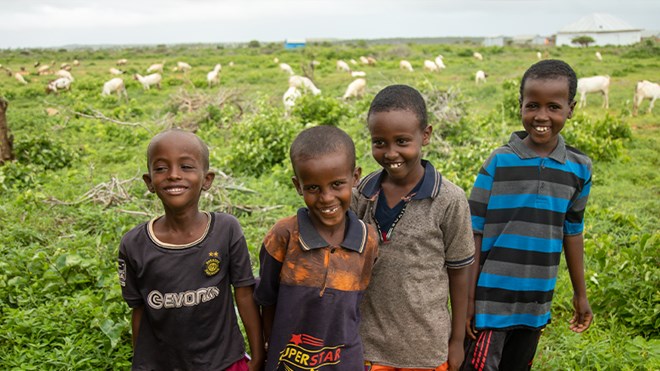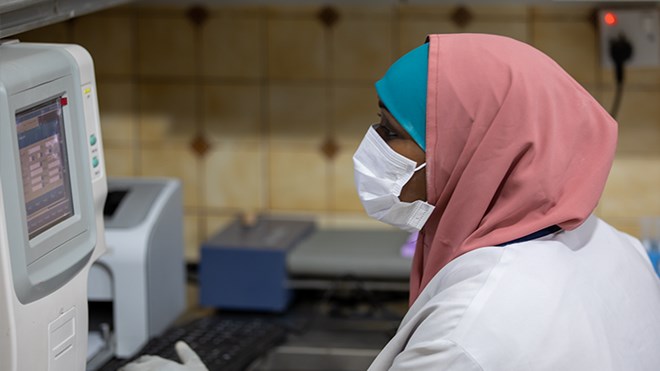
Friday October 2, 2020

Warsame Gure/World Bank
STORY HIGHLIGHTS
Recent reforms in Somalia have helped mobilize revenue, improve public finance management, and establish the basic legal foundations for a market economy.
in March 2020, Somalia cleared its arrears to the Bank Group, fully reestablishing its regular access to IDA resources for the first time in three decades
Since then, the World Bank has provided nearly $400 million in financing to help tackle the many urgent crises facing the country, while maintaining a line of sight toward long-term reforms and development goals.
Somalia is among the world’s most fragile countries. Roughly 70 percent of the population lives in extreme poverty. Most are deprived on at least one dimension of poverty—not just monetary poverty but also access to electricity, education, or adequate water and sanitation. Women and youth face severe barriers to economic participation. Close to 3 million people are displaced across Somalia by armed conflict and natural disasters. And in a country where agriculture remains important for jobs, exports, and the economy, unprecedented locust swarms and repeated cycles of flooding and drought are threatening food security and livelihoods.
But Somalia has also seen rapid and historic change over the past decade. After 20 years of protracted conflict and violence, the country adopted a provisional constitution in 2012, establishing a parliament and a federal political system. In the several years since, the government has enacted a wide range of fiscal, political, social and economic reforms focused on building institutions, strengthening the economy, and addressing the structural drivers of fragility. These reforms have helped mobilize revenue, improve public finance management, and establish the basic legal foundations for a market economy. Many have focused on strategic sectors, such as telecommunications, banking, and energy.Reestablishing our relationship with Somalia
Somalia’s ambitious reforms laid the foundation for reengagement with the World Bank Group and other bilateral and multilateral partners. In 2013, the Multi-Partner Fund for Somalia was established with donor countries to facilitate coordinated financing for the country’s sustainable reconstruction and development. In 2018, the Bank Group’s Board of Executive Directors endorsed a four-year Country Partnership Framework for Somalia—the first development strategy for the country since the early 1990s. And in March 2020, Somalia cleared its arrears to the Bank Group, fully reestablishing its regular access to IDA resources for the first time in three decades and paving the way to receive debt relief under both the Heavily Indebted Poor Countries (HIPC) initiative and the Multilateral Debt Relief Initiative. Once Somalia reaches the HIPC Completion Point, its external debt is expected to be reduced from $5.2 billion (as of end 2018) to $557 million (in net present value terms).
“The biggest achievement of the Bank has been to walk slowly, side-by-side, shoulder to shoulder, with the government, through a process of reform,” notes Kristina Svensson, the Country Manager for Somalia. “This reform progress will need to be sustained towards the HIPC Completion Point, with increased focus on delivering tangible benefits to the people of Somalia, especially the most poor and vulnerable.”
Responding to Somalia’s development needs
Since March 2020, the World Bank has provided nearly $400 million in financing to help the government tackle the many urgent crises facing the country, while maintaining a line of sight toward long-term reforms and development goals.
Our response prioritizes service delivery through investments in education and health to ensure that Somalia’s people—including the most vulnerable—can benefit from the country’s transition and institutional reforms. During the conflict, both non-state and private actors played an important role in sustaining basic services, but limited government oversight allowed services to become fragmented, costly, and inconsistent in quality. Through financing, analytics, and policy research, we are helping Somalia improve health and education services and develop more sustainable models of financing for these essential services through the public sector.
Women and girls are at the center of our response in Somalia. We are supporting efforts to improve women’s access to basic health services through a larger cadre of trained and qualified female health workers. We have also reviewed our projects in Somalia to assess and identify risks of sexual exploitation and abuse, sexual harassment and other forms of gender-based violence. We identified key mitigation measures, potential partners and risk management actors operating in the country, and entry points for engagement. We are preparing operations to boost girls’ enrollment and retention in schools, recruit female teachers, provide safe and accessible learning facilities, and strengthen health systems for women and girls.
We seek to accelerate Somalia’s progress in building institutions and strengthening governance. Our support will help the government mitigate the immediate impacts of the ongoing crises while continuing to implement the reforms needed to improve government coordination, strengthen fiscal management, and promote inclusive private sector growth. One example is the innovative new financing facility Gargaara, which is expanding financial access for micro, small, and medium enterprises (MSMEs), with a special focus on women-owned businesses.

Warsame Gure/World Bank
Mobile-based technology and platforms present an important opportunity to expand digital services in Somalia. An estimated 90 percent of adult Somalis own a mobile phone, while 73 percent use mobile money. In partnership with IFC, we have helped establish an independent telecoms regulator and boost competitive industry regulation, as well as a robust mobile money regulatory framework and digital payment systems. We are also helping the country develop a foundational, inclusive, and robust digital ID system to improve service delivery.To address the overlapping crises that the country is facing, we are supporting the Somalia Crisis Response Project, which focuses on meeting the urgent needs of people who have been affected by the impacts of climate change and public health emergencies. With partners such as the Food and Agriculture Organization, we are providing immediate support to help affected households recover livelihoods in the areas hardest hit by the locust swarms, flooding, and droughts. We are also helping the government establish a cash-for-work program, bring the locust population under control, boost agricultural production, and promote household hygiene. Our support will help rehabilitate critical infrastructure, including water and sanitation systems and health facilities. This crisis response project will also help the government manage and contain the COVID-19 pandemic through risk communication, surveillance, and contact tracing, as well as procurement of medical equipment and supplies in collaboration with the WHO, UNICEF, and the International Organization for Migration.
We are also supporting a safety net project that provides cash transfers to poor and vulnerable households, with a focus on women with children under the age of 5. These efforts (known as the Baxnaano Program) will help people meet their immediate food security needs and protect their livelihoods, while laying the foundation for a stronger national safety net system and helping build the country’s human capital.
Our partnership with Somalia exemplifies how the World Bank Group engages with countries affected by fragility, conflict, and violence to help them achieve good development outcomes amid complex and rapidly changing circumstances. By reducing its debt to sustainable levels, building strong institutions, and implementing effective reforms, Somalia will be able to build on the progress achieved in the past decade to better withstand the impacts of current and future crises. The World Bank Group remains committed to working across Somalia to help strengthen governance, boost the economy, improve social conditions, alleviate poverty, and generate sustainable employment. In doing so, we aim to achieve long-lasting development outcomes for its people.